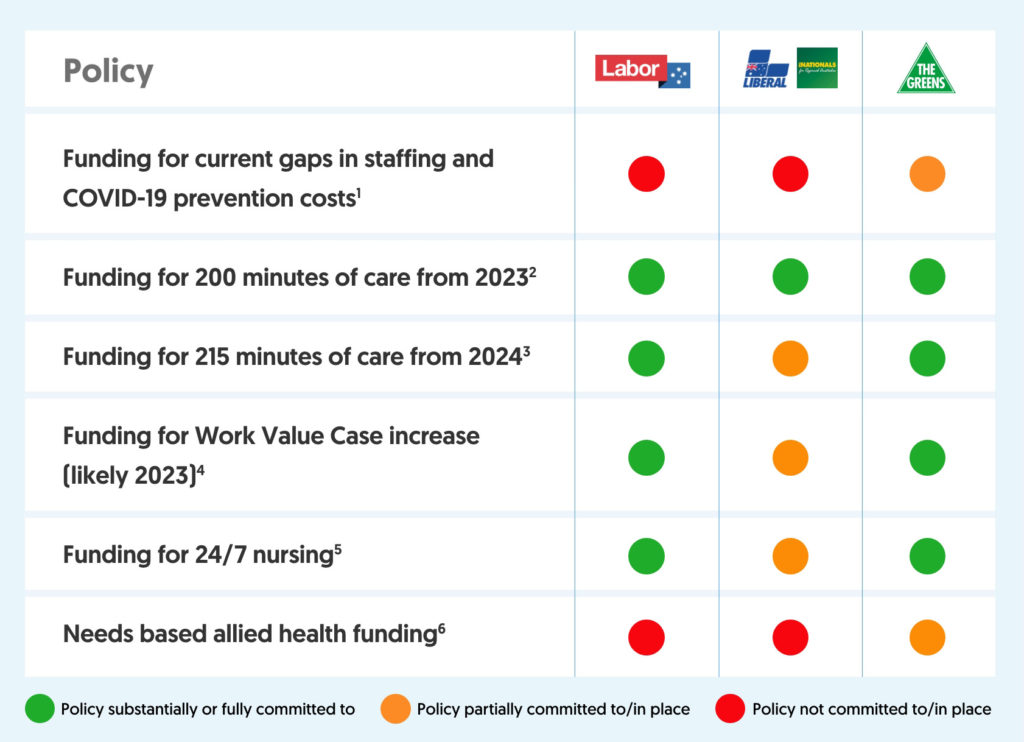
Aged care has been firmly on the agenda during the 2022 Federal election campaign.
The Australian Aged Care Collaboration represents more than 1,000 organisations that together care for 1.3 million older Australians.
The Collaboration has asked the major parties to join representatives of older people and their carers, providers, unions, and health professionals in supporting a National Aged Care Workforce Partnership.
This scorecard reflects the policy performance on the following key elements of a National Aged Care Workforce Partnership.

1 No party has committed to covering the current gaps in workforce availability and COVID-19 infection prevention funding (contributing to more aged care homes operating at a loss despite the $10 per resident per day Basic Daily Fee Supplement in residential care) meaning that for at least the next year, pressures in home and residential care are set to worsen. While much of the $6 billion commitment from the Greens (which commences 1 July 2022) is allocated to specific initiatives there may still be scope within this funding envelope to close current gaps. AACC ask: Workforce Partnership Supplement
2 The Coalition committed to requiring and funding 200 minutes of care per resident per day (the current average is 180 minutes) by October 2023, with funding for this commencing from October 2022. Labor has also committed to this. The Greens have proposed to increase staffing even further to 258 minutes of care per resident per day. For all staffing commitments, a key challenge will be finding the workforce. AACC ask: Workforce Partnership Supplement
3 Labor has committed to further increase residential care staffing to 215 minutes in 2024, with funding for this part of an overall $2.5 billion commitment over 2 years. The Coalition has stated that it also supports the 215 minutes. No funding has been committed to support this statement, though it has been stated that the independent pricing authority would take into account input costs, which starts recommending prices from 2023-24. The Greens have proposed to increase staffing even further to 258 minutes of care per resident per day. For all staffing commitments, a key challenge will be finding the workforce. AACC ask: Workforce Partnership Supplement
4 Labor and the Greens have committed to funding the outcomes of the Fair Work Commission work value wage case, where unions are seeking a 25 per cent increase in Award wages. The Coalition has said it would ‘honour’ and ‘abide by’ the Fair Work Commission’s decision but has refused to explicitly commit to full government funding, stating instead that ‘the independent pricing authority would take into account input costs’ which starts recommending prices from 2023-24. AACC ask: Minimum Wage Increase
5 Parties have made commitments to implement 24/7 registered nurses in all residential care. The Greens do not specify a date. Labor specifies July 2023, while the Coalition specifies 2024. For all parties, the key issue is whether there will be enough nurses to meet this requirement, particularly in regional and remote areas. The Greens say they have made provision for this within their overall $6 billion funding allocation. Labor states that the Parliamentary Budget Office has costed its commitment. The Coalition has not allocated specific funding but refers to the fact that the independent pricing authority would take into account input costs. AACC ask: Workforce Partnership Supplement
6 No party has committed to the development of a comprehensive needs based allied health funding model for aged care, though large funding commitments from the Greens to provide free access to mental health and dental care will likely be of assistance to those in aged care. AACC ask: Multidisciplinary aged care workforce
You can download and print the scorecard here to distribute it to staff and residents.